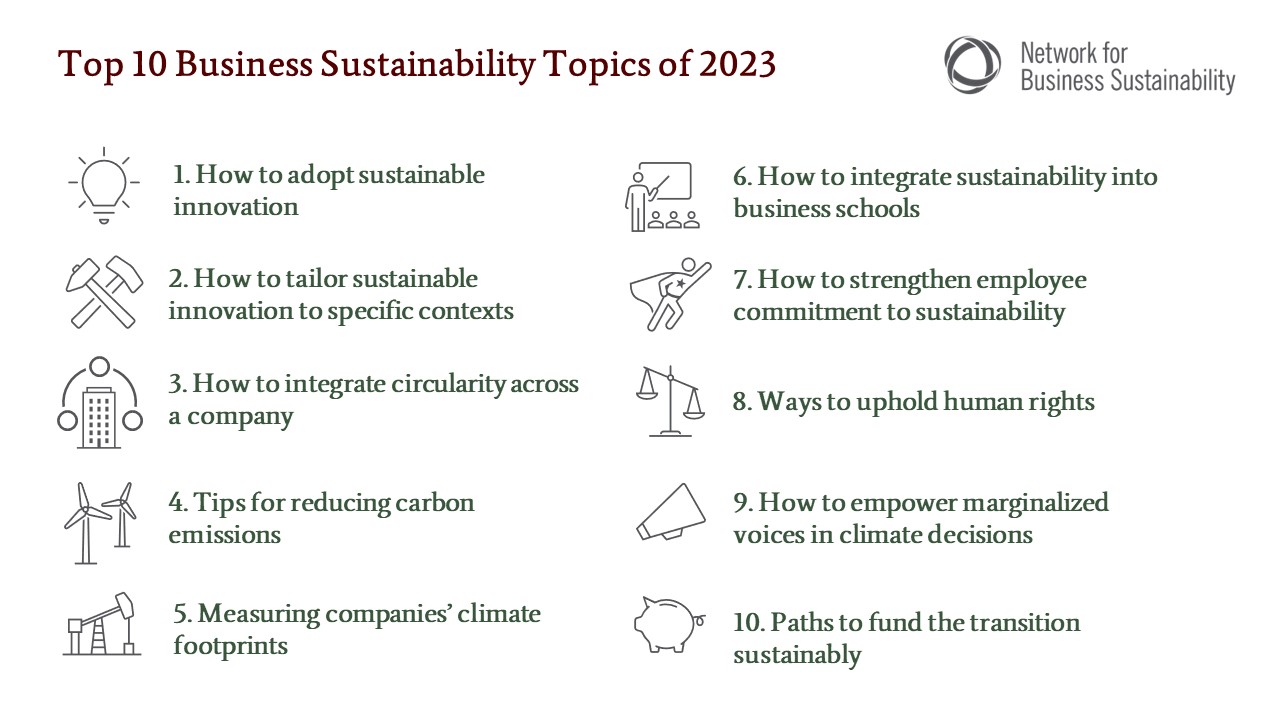Discover what sustainability professionals are most curious about in 2023.
What issues are top priority for sustainability professionals navigating the current business environment?
To answer this question, we surveyed members of the Network for Business Sustainability (NBS). This global network links managers, researchers, and others working to advance business sustainability.
We asked: What are your most pressing sustainability questions, challenges, or topics? Here we share the top 10 topics identified. NBS will produce content on these topics throughout the year.
Get involved: We want to hear from you! If something here makes you reflect, share your thoughts in the NBS forum or by filling out our “Share an Idea” form.
6 Areas of Sustainability
We asked NBS members to identify their priorities within the 6 areas of sustainability which are NBS’s “Knowledge Hubs.” The graphic shows these overall priorities, with sustainable innovation being top priority (22% of responses) closely followed by circular economy (20%).

Then, we asked for more details. What aspects of these six areas are most important?
Here are the top issues within each area, along with an existing NBS resource on each.
Top 10 Business Sustainability Topics of 2023

Sustainable Innovation
1. How to adopt sustainable innovation.
NBS members want to know how to create and implement sustainable innovations. How can companies “access existing initiatives, practices, and programs to accelerate the learning curve and implementation process?” asked one survey respondent, a North American consultant.
Get Started: What Is Sustainable Innovation provides a primer.
2. How to tailor sustainable innovation to specific contexts.
Sustainable innovation can look different in different settings. Managers want to know how to tailor approaches based on whether they’re working with start-up or an established company, a local business vs. a multi-national corporation. Location matters as well. A corporate professional from Asia asked: “How can developing countries like ours access sustainable innovations?”
Get Started: The Innovation North Compass shows how to tailor sustainable innovation.
Circular Economy
3. How to integrate circularity across a company.
The circular economy is defined as keeping resources in the economic system, through practices such as repair and reuse. Managers want more models and guidance. How can circular approaches be integrated into organizational cultures, processes, and strategy? “The circular economy is an unfamiliar concept to many people still,” noted a North American consultant. “It would be helpful to have highlights of success stories from around the world.”
Get Started: How to Accelerate the Circular Economy provides three case studies.
Climate Change
4. Tips for reducing carbon emissions.
Reducing emissions was the topic mentioned most by survey respondents. With new pressure to act on climate change, NBS members want to know how to get to “Net Zero” throughout operations. They’re also looking for specific solutions in areas from food production to transportation. And they seek inspiration. “How are ESG thought leaders making small but everyday choices to reduce their carbon footprint?” asked a North American corporate professional.
Get Started: How to Be a Net Zero Company offers guidance (with a video).
5. Measuring companies’ climate footprints.
As companies make climate commitments, they’re grappling with measurement. “What are comparable approaches to measure CO2 emissions?” asked a corporate professional from Europe. “What are the most appropriate measurements of climate action in each industry?” asked a consultant from Oceania.
Get Started: Mandatory Carbon Reporting — 6 Ways Companies Can Prepare.
Sustainability in Business Education
6. How to integrate sustainability into business schools.
Business schools shape future leaders. Too often, sustainability hasn’t been part of what those leaders learn. NBS members want that to change. We need to “mainstream sustainability education into all curricula,” writes a European entrepreneur. That means finding ways to build sustainability into every course, from accounting to strategy, survey respondents said.
Get Started: NBS’s Sustainability Education Resource Centre provides different ways to teach differently.
7. How to strengthen employee commitment to sustainability.
Current employees also need to help advance change in companies. NBS members want to know what knowledge and encouragement can facilitate this. How can “sustainability education for existing staff enable transformation?” asked a corporate professional from Europe.
Motivation matters at all levels. “There still seem to be too many climate-resistant and climate-hesitant people in management and leadership positions,” noted a North American policymaker.
Get Started: How to Motivate People Toward Sustainability provides psychology tips.
Social Justice
8. Ways to uphold human rights in the supply chain.
Supply chain operations can be distant and full of social and environmental problems. As companies take more responsibility for their supply chains, they want to know how to address modern slavery and advance living wages. A European corporate professional wrote about human rights in international value chains: “[What are] approaches for due diligence and REALLY having a positive impact?”
Get started: Fight Slavery in Your Supply Chain draws on research and practical experience.
9. How to empower marginalized voices in climate decisions
Climate change will cause greatest harm to poor and vulnerable people. Social sustainability requires considering their needs. This means “equal participation of all stakeholders, particularly those who do not have voice and face the worst consequences of climate change,” wrote a corporate professional from Asia. Reducing inequality is a broader goal. There’s a need for examples of organizations with “successful social justice strategies and processes,” wrote a North American academic.
Get Started: What Is Social Sustainability provides an overall framework for action.
Sustainable Finance
10. Paths to fund the transition to sustainability.
Business leaders want to unlock capital to support their transition to more sustainable practices. They want to know about funding sources from government and the ESG investing boom. Can they leverage “global initiatives in responsible investing to inform companies about opportunities to access capital?” asks a North American consultant.
Get Started: How to Finance Your Sustainability Strategy describes how to access impact investing and green bonds.
About the Survey
326 people completed the NBS survey. They represented a diverse set of sustainability professionals. Here’s a breakdown of our audience and methods.
Occupation & Experience
48% of survey respondents were from academia, 44% were business professionals, and 8% represented the social sector and public sector.
Most respondents had over 20 years of experience in their field. The remainder were divided across experience levels.

Geography
Most survey respondents came from North America and Europe (each 34%). A combined 32% of respondents came from other geographical areas.

Through differences in occupation, years of experience, and geography, we celebrate the diverse perspectives on sustainability that the NBS community offers.
Methods and Process
NBS staff shared the survey in late 2022 through the NBS Newsletter, which reaches almost 10,000 sustainability professionals. We also shared the survey through our social media channels.
We analyzed the demographic data and the number of responses within different Knowledge Hubs. Then, we looked for themes in respondents’ written comments, which described their priority challenges and questions. For example, one theme was “human rights” within the Social Justice Knowledge Hub. We grouped the comments according to these themes. Weighing these themes by popularity, our list of the top 10 sustainability topics came together!
Answers to the questions – Coming soon!
NBS’s Content Committee — global experts from research and practice — is advising NBS staff on how to produce the best content related to these topics. This content will support managers on sustainability action throughout the year.
What Do You Think?
Survey respondents indicated that sustainable innovation (22%) is the top sustainability priority of 2023. What is your top sustainability priority this year?
Share your thoughts in the comments below.



Add a Comment
This site uses User Verification plugin to reduce spam. See how your comment data is processed.This site uses User Verification plugin to reduce spam. See how your comment data is processed.